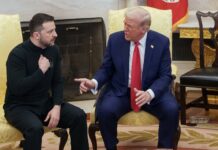
This has been quite an eventful week in the journalism industry after it had been revealed that two major newspapers in the United States had made the decision to not endorse a candidate in this year’s US Presidential election. First, you had the owner of the Los Angeles Times, Patrick Soon-Shiong, informing the editorial board that they would not be making an endorsement, then not long the Washington Post revealed that it would be doing the same, a decision by the Post’s owner Jeff Bezos.
These decisions to not make a presidential endorsement have been met with great anger and controversy. In response, we have seen both papers losing subscribers. NPR reported that following Bezos’ decision to not make an endorsement, the Washington Post saw around 200 000 subscription cancellations. Likewise, the Los Angeles Times saw around 2000 of its subscribers cancelling their subscriptions as well, citing “editorial reasons.”
The editorials’ editor of the Los Angeles Times, Mariel Garza, would even resign in protest against the decision made by the owner of the paper, telling the Columbia Journalism Review that “I am resigning because I want to make it clear that I am not okay with us being silent.” Garza would even go on to stress that “In dangerous times, honest people need to stand up. This is how I’m standing up.”
Now, it is quite obvious who these two papers were going to endorse. It is no secret, they obviously would have endorsed the Democratic Party candidate, Kamala Harris. The Washington Post and Los Angeles Times are both considered to be very liberal papers, so the odds of them endorsing Donald Trump for president were basically non-existent. It has even been reported that with their endorsement of Kamala Harris, the Washington Post would have done a whole series on why not to vote for Donald Trump, before the decision to cancel making endorsements had been made.
In all honesty, it’s not as if an endorsement of a presidential candidate are as influential in the modern day, as they may have been in the past. The idea that there are a handful of voters somewhere just waiting on the endorsement of these newspapers before they make a decision is very unlikely. Moreover, it is safe to assume that the readership of the papers are already very liberal as well and are likely to vote for Kamala Harris anyway,
So if presidential endorsements do not carry as much weight in the modern day, and we pretty much already know who the paper’s would have endorsed; why is this decision then so controversial? The reason for the controversy really comes down to two fundamental factors: 1. Donald Trump’s perceived threat to democracy and; 2. The influence of billionaire owners on the editorial decisions of major media outlets.
The first reason is that American politics has just become so polarised. Both candidates have been stoking fear about the future of America, were their opponents to win the election. Donald Trump has stoked fears over migration to voters, describing the arrival of migrants into America as an invasion. Throughout the campaign, he has repeatedly claimed that criminals, rapists, and terrorists have been pouring into the United States throughout the Biden-Harris administration.
Likewise, Kamala Harris has been stoking fear about a Trump second term. Claiming that Trump is a threat to American democracy and that access to abortion would be banned were Trump reelected president. Harris and other Democrats have painted this election as vital for protecting America’s democratic institutions against authoritarianism that would be brought on in a second Trump term.
Both sides are basically painting this election out to be one of the most important in American history and that has made for a very politically charged environment. So for liberal and progressive readers to see these major newspapers deciding not to endorse Kamala Harris, they see it as a major betrayal. The decision has been criticised by some as a betrayal to women and to America’s democratic institutions. There are many who are truly that passionate about this election.
However, the owners of the Los Angeles Times and the Washington Post have pointed to the current level of political polarisation in the United States as the reasoning behind not endorsing a candidate. Patrick Soon-Shiong, the owner of the Los Angeles Times, stated that he made the decision not to endorse in order to ease the sharp divisions among the electorate.
Jeff Bezos, the owner of the Washington Post, published a column in the Post where he stated that Presidential endorsements serve to create a perception of bias within news organisations at a time when trust in news media is at an all-time low. However, both owners have been criticised for putting their personal interests ahead of the well-being of the paper they steward. With Bezos in particular, there has been much speculation that he made the decision in order to avoid drawing the ire of a potential Trump presidency when it comes to the issuing of government contracts.
This speaks to one of the major criticisms of media outlets in the modern day. The influence that billionaire owners are having on the coverage of major media outlets, and the emphasis of increasing profit margins ahead of serving the public. Meanwhile, increasingly, the whole journalism industry has continued to suffer from falling revenue and an increasing lack of trust in the media in general, making a career in Journalism seem less and less appealing each year.











